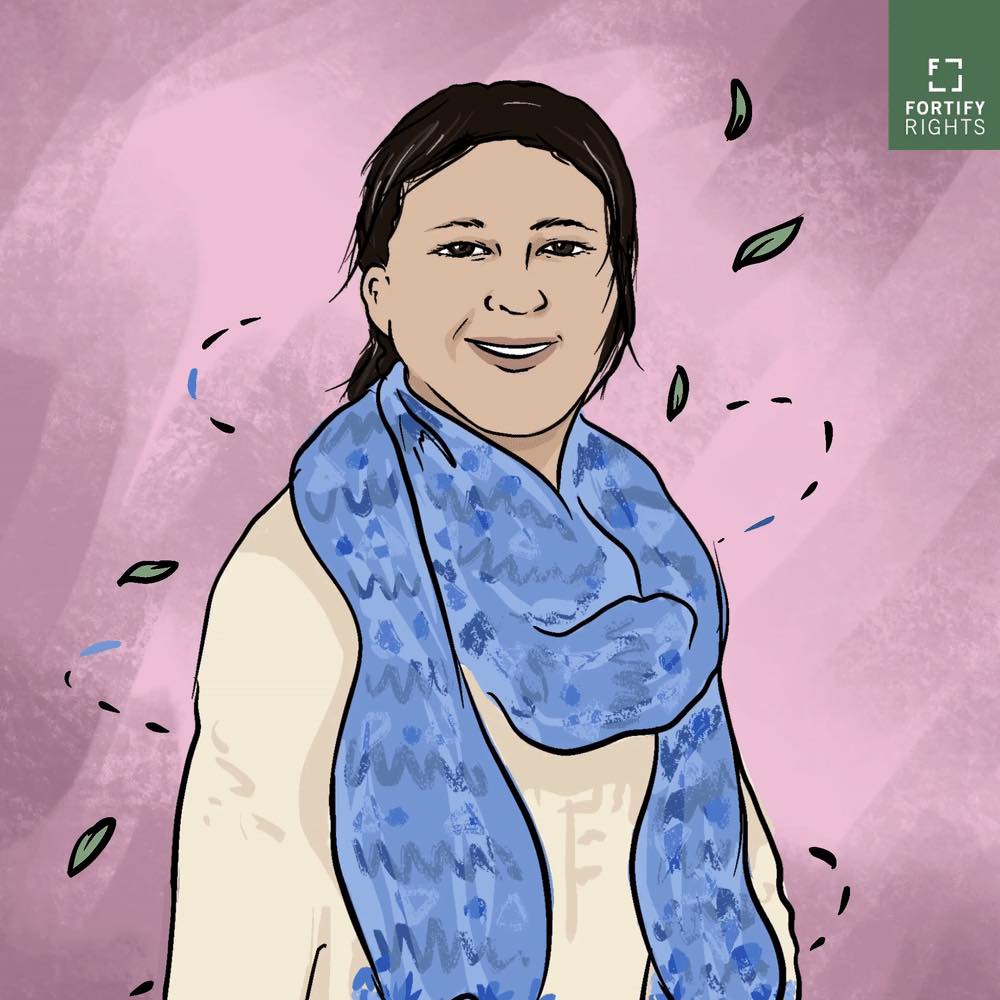“Spreading awareness is one of the main ways we can prevent gender-based violence.”
By Winnie Sachdev for Fortify Rights. Illustrations by Tams Lu.
Thailand’s northern province of Chiang Mai has long been home to a large migrant community, including tens of thousands of people from neighboring Myanmar. Yet the path to achieving protection and rights for migrant-women survivors of gender-based violence in Thailand continues to be beset by obstacles—and that’s where the work of Mai Mai begins.
Born in Northern Shan State, Myanmar, Mai Mai, age 51, moved to Thailand in 2007. Driven by a desire to improve the lives of migrant workers and have a positive impact on the world, she began volunteering as a teacher at the Thinking Classroom Foundation, a school providing education to migrant children in Chiang Mai. Two years later, Mai Mai applied for a job with the Migrant Assistance Program (MAP) Foundation, a grassroots organization in Thailand that serves migrant communities from neighboring Myanmar. She began working in MAP’s Women’s Exchange Program, which, since 1999, has supported and empowered migrant women in the Chiang Mai area and beyond who experienced domestic violence and/or sexual violence.
“Through this work, I see that migrant women have increased knowledge and capacity to stand up for themselves and make decisions that are self-empowering—this is the inspiration that drives me to continue doing what I do,” Mai Mai told Fortify Rights. “I also want to amplify the voices of migrant women so we can be part of the force that drives the implementation of a policy that can protect our rights, instead of only letting others speak on our behalf. I want to put migrant women into action so we can be involved in the betterment of our own future.”
Domestic violence is the most pervasive form of gender-based violence among migrant communities in Thailand, according to Mai Mai, and this includes physical, psychological, and/or sexual violence. When women flee abusive situations, she explained, they often leave without any personal belongings, compounding the harms they survived.
In her role leading MAP’s Women’s Exchange Program, Mai Mai provides basic necessities to affected women and oversees leadership-training events, capacity-building activities, networking trips, and case-management support. Mai Mai provides counseling services and information on available resources and women’s rights, she coordinates with local shelters and lawyers based on women’s needs, and she provides food, clothing, financial assistance, translation support, and transportation to and from hospitals and police stations.
In many cases, Mai Mai and her colleagues are key to the protection for survivors of domestic violence in Thailand.
“Although the law [in Thailand] does not exclude protection for migrant women, government agencies are selective about when and where they wish to implement the law—this is one of the biggest challenges we face,” she said. “Some men are also aware that migrant women can’t communicate in the local language, may be undocumented or unaware of the law, so they feel they can do whatever they want, and the woman will not dare report the case.”
Men in the migrant community as well as employers also present significant obstacles to Mai Mai’s efforts to empower women.
“Husbands and partners of women often do not want them to join our program. They view us as the enemy. They are afraid that women will become smarter and more capable than them, which [would] make it more difficult [for men] to continue playing a domineering role,” she said. “In terms of employers, they don’t like it when we organize activities that educate women on their rights, as this leads to women demanding the rights that they are entitled to, such as healthcare benefits and overtime compensation, but which are often intentionally withheld from them.”
Mai Mai’s work with the MAP Foundation also provides biannual leadership skills trainings to migrant women in northern and southern Thailand. As part of those efforts, women from local organizations and networks convene to discuss topics such as the origins of power in society, personal development, leadership skills, and labor rights, as well as to build self-awareness and self-esteem. And it works. The trainings serve to create a space for women to network with one another, with the aim that participants develop the skills necessary to mobilize, organize, and support migrant women in their own communities.
“Moving forward, I want to see that all women, on a global scale, enjoy equal rights as men. I want women to be informed about their rights and to continue spreading knowledge to other women in their communities as widely as possible. Spreading awareness is one of the main ways we can prevent gender-based violence.”
Winnie Sachdev is a Thailand Human Rights Associate with Fortify Rights. Follow her on Twitter @winnie_sv.



